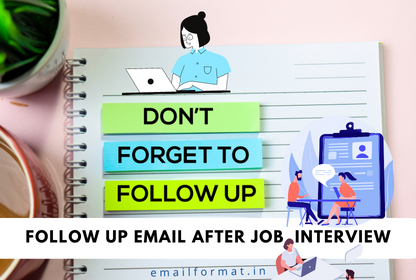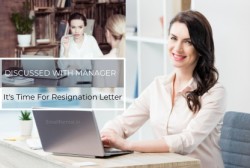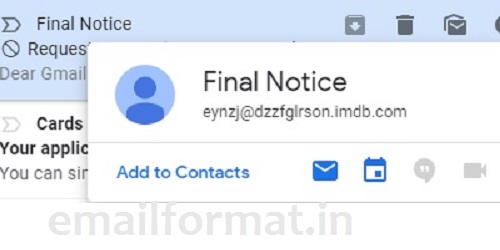How To Write A Follow Up Email After Job Interview?
In general, you can send three types of follow-up emails after an interview: one to your interviewers right after the interview, a second follow-up if you haven't heard back in a timely manner, and a "check-in" email to keep in touch for additional connections.
Before receiving an official response, you may only need to send an initial thank you note to your interviewer. However, weeks can pass after an interview without receiving a response from a potential employer. We'll go over the best ways to write follow-up emails after an interview and provide examples for you to use.
Send a follow-up email just after the interview
According to the report, 91% of employers prefer to receive follow-up thank you notes. Despite this, another study found that 57% of candidates do not send them.
Isn't math simple? Following up with a thank you email after your interview puts you ahead of more than half of the competition.
When is it appropriate to follow up after an interview?
The sooner, the better—the same day as the interview or the following day, but no later than 24 hours after the interview.
What is the best subject line for an interview follow-up email?
One that is brief and conveys the message clearly. Consider the following examples.
Sample Subject Lines for a Follow-Up Email after an Interview
-
Thank you very much, [Interviewer's Name]!
-
Thank you for taking the time today!
-
Thank you for this wonderful opportunity!
-
Thank you for your time and advice.
-
I was interested in learning more about [Company Name]. Thank you!
How to follow up just after an interview?
-
Begin with a formal salutation and introduce yourself to the hiring manager by name.
-
If you interviewed multiple people, send a separate follow-up note to each of them.
-
Express your gratitude and confirm your interest in the position. Refer to specific company plans discussed during the interview in the follow-up.
-
Refer to specific company plans discussed during the interview in the follow-up.
-
Suggest how your experience and skills can assist them with their problems.
-
Say you're willing to provide any additional information the hiring manager requires, and confirm when a final decision will be made.
And here's a sample follow-up email after interview you can modify and use as your thank you message.
Sample Follow-Up Email Just After an Interview
Dear [Mrs. Asha],
Thank you so much for taking the time this morning to speak with me about the position of [Senior UI Developer] with [Infosys]. I enjoyed learning more about your [inventive strategy / forthcoming challenges / core principles / business insights].
The information you provided about the role impressed me that it is a job I would relish and one where I could contribute valuable skills and experience.
I was also considering what you said about [Angular skills]. In my previous position as [UI Developer], I discovered that [I am comfortable with Angular].
Finally, please find attached information about some of my projects that we discussed. Please do not hesitate to contact me if you require any additional information. I'm looking forward to our call next week, as planned.
Thank you once again, [Asha].
Yours Sincerely,
[Your name]
Although the recipient already has your email address, it's a good idea to include a few other contact information, such as your work address, website URL, or direct phone number.
Send a follow-up email just after the phone interview
Is There a Difference Between a Phone Interview and a Follow-Up Email?
That depends on the nature of your phone interview.
After submitting an application, a regular phone interview? The standard interview follow-up email rules apply.
However -
What if you were screened as part of the sourcing process? That is, what if the employer found you rather than the other way around?
If you're interested, state it clearly. Recruiters frequently conduct multiple interviews on the same day. Their job is to start engaging candidates and weed out those who aren't genuinely interested in the opportunity. Demonstrate your commitment.
How do you compose a follow-up email after a phone interview?
-
Thank you for your time and consideration.
-
Highlight your enthusiasm. Be as specific as possible: state which aspects of the job pique your interest and why.
-
Include your resume and a cover letter outlining your motivation and key selling points.
-
Keep it brief.
What is the best subject line for follow-up email after phone interview?
The best subject lines for your follow-up email are clear, concise, and express gratitude for your interviewer's time.
Sample Subject Line for a Follow-Up Email after an phone Interview
Here are the best phone interview follow-up email example subject lines
-
Thank you for your consideration, [Insert name of interviewer]
-
It was a pleasure speaking with you today!
-
Thank you for this opportunity!
-
I respect your time and advice.
-
Follow-up on [insert position title]
Sample Follow-Up Email After Phone Interview
Dear [Mrs. Shital],
Thank you for taking the time to speak with me today. I enjoyed learning more about [Cognizant]. It was wonderful to discover that you share my perspective on [test automation]. I particularly liked the way you [specific company detail learned during the interview].
I'm looking forward to meeting you in person and discussing our future collaboration. Please find my resume and cover letter with detailed work experience attached.
Thank you once again, [Shital].
Best Regards,
[Your name]
After the interview, are you still interested in the job? Send a thank-you email in any case. Thank them for their time and consideration, explain why the position isn't a good fit for your skills and experience, and let them know you'd like to be contacted if they have any suitable openings. On the job market, never burn bridges.
How to Follow Up after a Second Interview of Job?
The main difference between the first and second interview follow-up emails for job is that the deeper you go in the recruitment process, the more detailed your messages should be.
You've tried talking about specific plans and challenges, as well as job details. Following a second interview, include information in your follow-up letter about how you would handle them.
If you interviewed with multiple people, send separate, personalised notes to each of them, just like you did with the first interview.
Sample Follow Up Email After a Second Interview of Job
Dear [Mr. Vinay],
Thank you for inviting me to come and talk for the second time. I am now even more convinced that working with [DevOps team] would be a dream come true for me.
I began to consider the [project] that we discussed — I have some ideas for how we could make it a success. In the attached presentation, I describe them briefly. Please tell me what you think. I'd be happy to explain the details and hope to speak with you about them later.
Thank you once more for your time and counsel. I eagerly await your response.
Best,
[Your name]
So you know how to send a follow-up email after an interview. You wrote the perfect follow-up letter and sent it immediately after the meeting. After that, weeks passed. There is no call-back.
Don't give up hope. You could still be in with a chance. And, with one more follow-up email, you could be the top seed.
How to Send a Follow-Up Email When You Have Not Received a Response?
It may be difficult to write a follow-up letter after an interview if there has been no response.
Overall, you're trying to check in by asking a seemingly inconvenient question, "When are you going to make up your mind?"
You must inquire about the interview outcome politely and professionally so that you do not come across as a nuisance.
Is it then a good idea to send one?
Yes. But only when done correctly.
When should you send a job interview follow-up email after no response
You can write the follow-up email only after the specified deadline has passed.
You received another offer, and if you intend to accept it, notify all other companies.
If, on the other hand, you prefer to work with this company rather than that one, tell them about the competitive offer—if they're interested in you, they'll be willing and ready to speed up the decision-making process.
What should your second follow-up email say?
-
Remind them of the deadline that has passed.
-
Declare your continued interest.
-
Mention about the offer in hand.
-
Inquire if they require any additional information from you.
Let's look at the sample second follow-up email after interview with and without offer in hand.
Sample Second Follow-Up Email after Interview (without offer in hand)
Dear [Mr. Dev],
I wanted to check in because you mentioned during our last interview that you'd make the final recruitment decision for [DevOps position] by [19th Jun 2022].
Please let me know if there is an update and if there are any additional details I can provide to help with the hiring process.
Regards,
[Your name]
Continue reading to check another example of a follow-up email after a job interview when you have another offer in hand.
Sample Second Follow-Up Email after Interview (with offer in hand)
Dear [Mr. Dev],
I'd like to inform you that I've been offered a position with another organization. My deadline for accepting or rejecting it has passed [the set deadline]. My timeline for accepting or rejecting it is [25th June 2022].
However, if you decide to hire me as your new [DevOps lead], I would gladly decline that offer. Please let me know if you anticipate making a hiring decision before the deadline I set with another organization.
Please let me know if you require any additional information from me.
Best Regards,
[Your name]
Viewers visiting this page are also referring to
Email Writing Format: Guidelines and Samples
Prompt Timing and Personalization
Send your follow-up within 24-48 hours while the interview remains fresh. Personalize each email by mentioning specific discussion points from your conversation. Address interviewers by name and reference unique aspects of your dialogue to demonstrate your engagement and attention during the meeting.
Reinforce Your Value Proposition
Briefly reiterate why you're the ideal candidate, connecting your skills to the role's requirements. Highlight one or two key qualifications you want to emphasize, possibly addressing any questions you feel could have been answered more thoroughly during the interview itself.
Professional Tone and Next Steps
Maintain a courteous, professional tone while expressing continued enthusiasm. Politely inquire about the decision timeline if not already specified. Close by thanking them again for their time and consideration, leaving the door open for further communication or questions they may have about your candidacy.
Finally, How To Write a Follow-Up Email After Job Interview?
Here's how to write an perfect and effective follow-up email after job interview:
-
Within 24 hours of the interview, send the first interview follow-up email.
-
Send a personalised email to each person you interviewed with.
-
Make it specific (especially when following-up on a second interview).
-
Inquire if they require any additional information from you.
-
Make suggestions for how you can assist the company with its problems.
-
Send a second follow-up email to request an update.
-
If you do not receive a response within the specified time frame.
-
If you've received another offer, whether or not you intend to accept it, follow up even sooner.
-
Even if you don't get the job, keep in touch with the company. Networking is now more important than ever!
People also looked at subject line for resignation email, and our real resignation letter email samples.
Additional Posts on Emails




